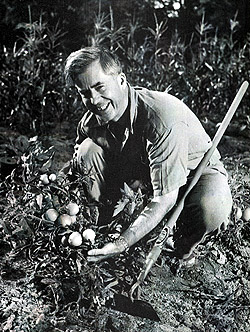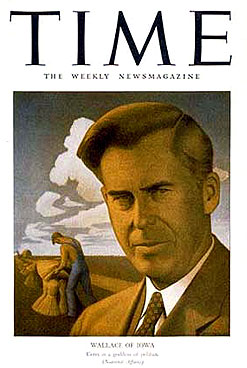Henry A. Wallace – An Authentic American Dreamer
 In 1934, Henry A. Wallace recognized the great historical and spiritual significance of the reverse side of the Great Seal that America's Founding Fathers designed 152 years earlier in 1782. He called FDR's attention to the imagery – suggesting it be put on a coin – which inspired the President to have both sides of the Great Seal put on the one-dollar bill.
In 1934, Henry A. Wallace recognized the great historical and spiritual significance of the reverse side of the Great Seal that America's Founding Fathers designed 152 years earlier in 1782. He called FDR's attention to the imagery – suggesting it be put on a coin – which inspired the President to have both sides of the Great Seal put on the one-dollar bill.
Wallace saw beyond the politics and economics of the New Deal, beyond Masonic and Catholic. He was a farsighted man, a visionary, like the designers of the Great Seal. It is fitting that he brought their symbolic message to our attention.
Unfortunately, Wallace is often reduced to a one-dimensional character, a mystic, by conspiracy theorists. To their way of thinking, only a Mason or mystic could possibly appreciate the symbolism of the pyramid & eye. Nonsense! Intelligent people of all stripes recognize the brilliance of the Great Seal's design.
President Roosevelt understood Wallace.
On July 10, 1940, five days before the Democratic Convention, German warplanes made their first direct attack on England. With war on the horizon, FDR said, "Henry Wallace is the best man to nominate in this emergency." When one of FDR's close advisors worried that many people considered Wallace a mystic, Roosevelt snapped, "He's not a mystic. He's a philosopher. He's got ideas. He thinks right. He'll help the people think." That November, Wallace was elected Vice President of the United States during Roosevelt's third term.
Library of Congress historian Paul Sifton said, "Wallace is among the most genuinely learned men in American public life since Benjamin Franklin and Thomas Jefferson."
Below are excerpts from Wallace's 1934 book, Statesmanship and Religion, based largely on a series of lectures he gave at the Chicago Theological Seminary – the year he alerted FDR to the reverse side of the seal.
And it was a quite a year:
"In 1934 alone, Secretary of Agriculture Wallace traveled more than 40,000 miles by car, train, boat, and plane. He made public appearances in all 48 states, delivered 88 speeches, wrote 20 articles for magazines and journals, published two books and a lengthy pamphlet, received two honorary degrees, and met with reporters by the score." (American Dreamer: A Life of Henry A. Wallace)
|
Statesmanship and Religion by Henry A. Wallace
"I cannot but feel that the destiny of the world is toward far greater unity than that which we now enjoy, and that in order to attain such unity it will be necessary for the members of the different races, classes and creeds to open their hearts and minds to the unfolding reality of the immediate future in a way which they have never done before."
"The duty of the prophets of this age. The stage is set for their passionate thunderings, their intense longings, their visions of ultimate purposes. They can usher in a millennium – the 'Novus Ordo Seclorum' – or they can consign us, because of our unbelief and hardness of heart, into captivity of long years of suffering."
"We need a 'heart trust' – a trust in the innate goodness of the human heart when it has not been warped by the mammon worship, the false science, and the false economics of the nineteenth century.... Yes, we need a 'heart trust' even more than we need a 'brain trust.' But perhaps some intelligence can help remove some fetters from the human heart. And perhaps the human heart can direct and rekindle the human brain."
|
In American Dreamer: A Life of Henry A. Wallace,
biographers John C. Culver and John Hyde write:
"The ardent seeker of cosmic truth, throughout the 1920s Wallace was engaged upon a fantastic spiritual voyage, a quest for religious understanding that took him from the pews of mainstream Protestantism to the esoteric fringes of Eastern occultism."
Truth Seeker
Ever since he was mentored in his youth by renowned botanist George Washington Carver, Wallace sought out great thinkers and explored the world for knowledge. He looked into Theosophy and was a Freemason for 20 years, corresponded with a controversial Russian psychic, and participated in Onondaga Indian spiritual rituals with tribal elders.
Senator Joe McCarthy accused Wallace of being a communist, which he never was.
 More excerpts from this compelling biography, American Dreamer (W.W. Norton & Company, 2000):
More excerpts from this compelling biography, American Dreamer (W.W. Norton & Company, 2000):
"He epitomizes American civilization in its most genuine native form, the form which gave us an Andrew Jackson and an Abraham Lincoln. He is as earthy as the black loam of the corn belt, as gaunt and grim as a pioneer. With all of that, he has an insatiable curiosity and one of the keenest minds in Washington, well-disciplined and subtle, with interests and accomplishment which range from agrarian genetics to astronomy." – John Franklin Carter, The New Dealers, 1934
The future, Wallace declared, has "one essential – the continuous rebirth of liberalism." He continued, "You may well ask what I mean by a liberal person. A liberal is a person who in all his actions is continuously asking, 'What is best for all the people – not merely what is best for me personally?' Abraham Lincoln was a liberal when he said he was both for the man and the dollar, but in case of conflict he was for the man before the dollar. Christ was the greatest liberal of all when he put life before things." – The New Liberalism, Sept. 21, 1944
At a Harvard Law School forum, Wallace was asked, "What is a liberal?"
"To me a liberal is one who believes in using in a nonviolent, tolerant and democratic way the forces of education, publicity, politics, economics, business, law and religion to direct the ever-changing and increasing power of science into channels which will bring peace and the maximum of well-being both spiritual and economic to the greatest number of human beings. A liberal knows that the only certainty in this life is change but believes that the change can be directed toward a constructive end." – Liberalism Reappraised, May 1, 1953
In response to his forced resignation as President Truman's Secretary of Commerce (for opposing a cold war with Russia), Wallace broadcast a statement on Sept. 20, 1946:
"Winning the peace is more important than high public office. It is more important than any consideration of party politics. The success or failure of our foreign policy will mean the difference between life and death for our children and our grandchildren. It will mean the difference between the life and death of our civilization. It may mean the difference between the existence and the extinction of Man and of the world. It is therefore of supreme importance, and we should every one of us regard it as a holy duty to join the fight for winning the peace."
Wallace received heartfelt thanks from many for his efforts toward world peace.
Albert Einstein wrote Wallace on Sept. 18, 1946:
"Your courageous intervention deserves the gratitude of all of us who observe the present attitude of our government with grave concern."
Helen Keller wrote Wallace on Oct. 11, 1946:
"Rejoicing I watch you faring forth on a renewed pilgrimage looking not downward to ignoble acquiescence or around at fugitive expediency, but upward to mind-quickening statecraft and a life-saving peace for all lands."
|
